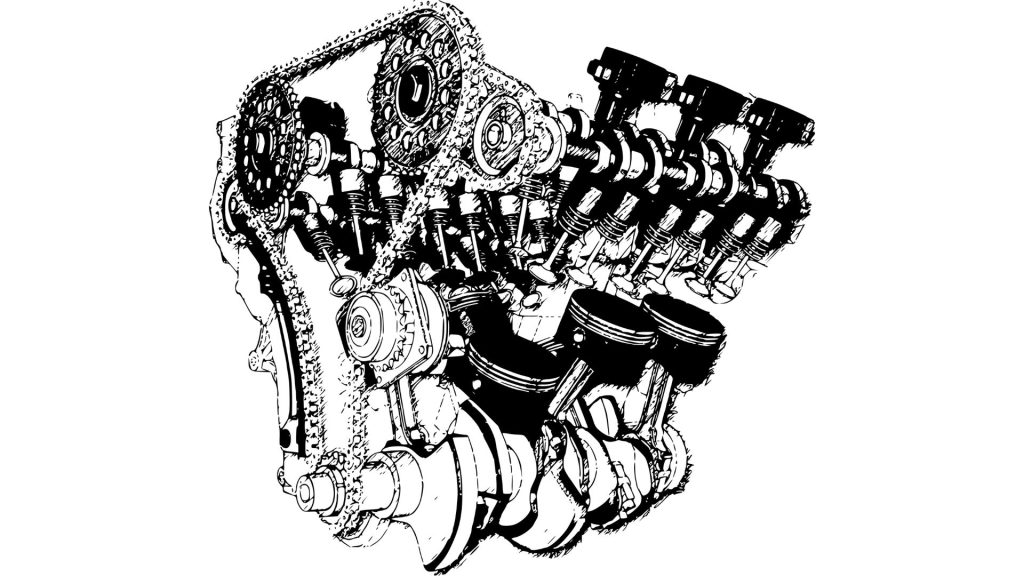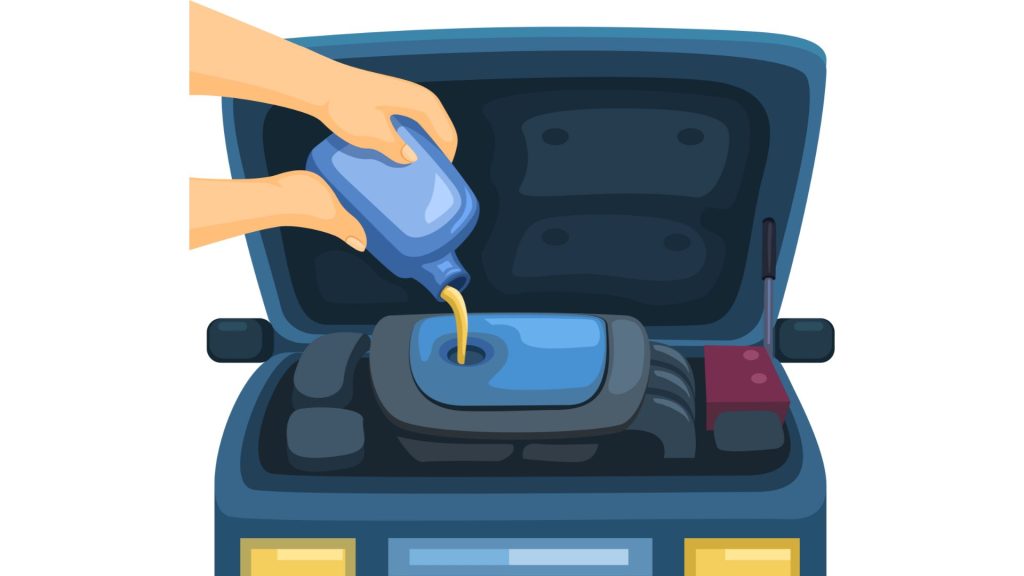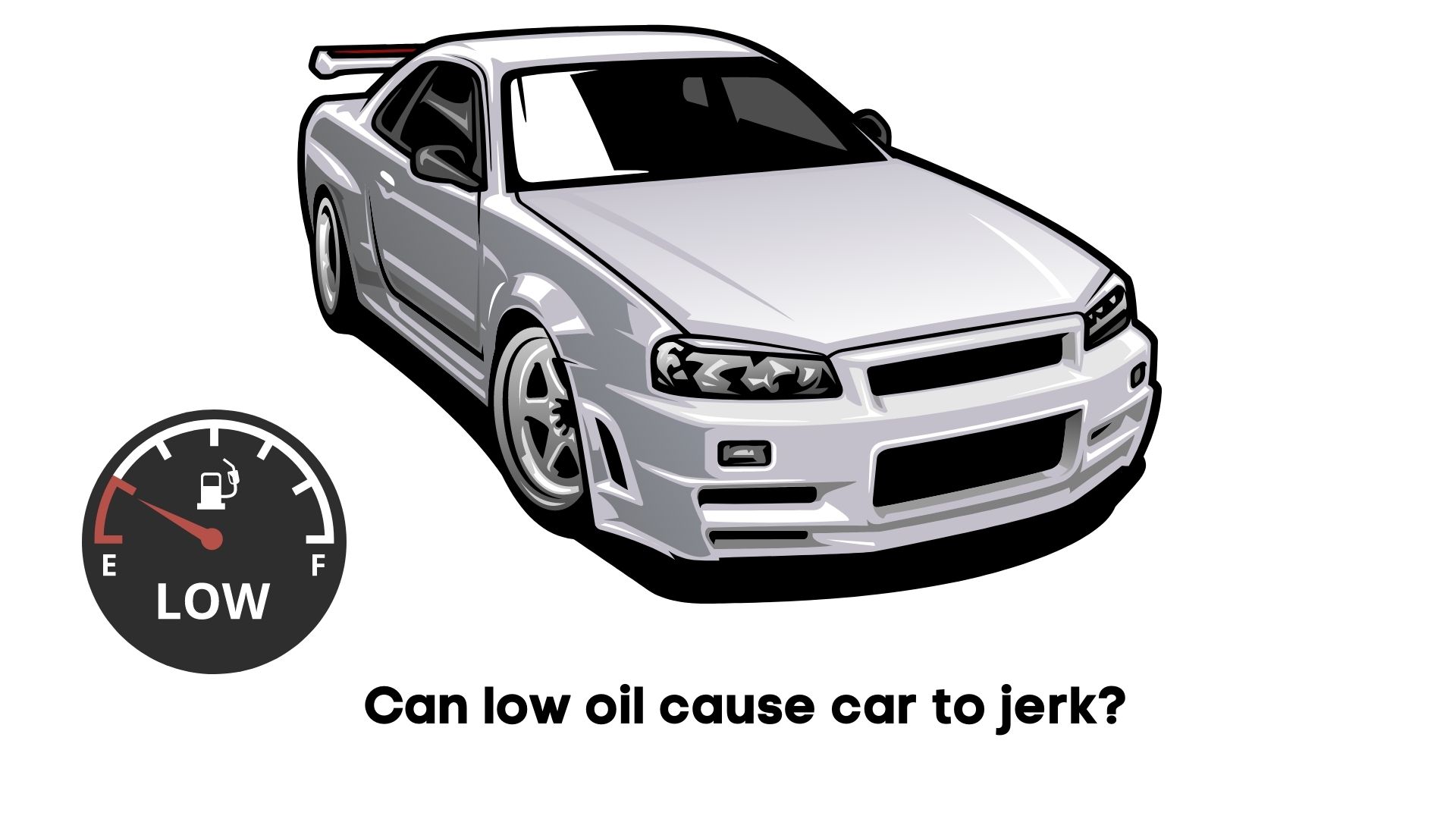Low oil can cause car to jerk because the engine’s moving parts are not adequately lubricated. Therefore, the increased friction produces disruptive vibrations that manifest as shaking and jerking in the car.
However, it is worth noting that jerking in a car can occur for various reasons. Unless you have concrete proof that your vehicle’s oil levels are low, don’t blame the oil until you’ve ruled out the following:
- The spark plugs ignite the air/fuel mixture in the combustion chamber. Faulty spark plugs disrupt the combustion process, which leads to bucking and jerking. Interestingly, oil can interfere with combustion when it leaks and coats the spark plugs.
- If your car loses power and jerks while you drive, the injectors are probably dirty. The vehicle will stutter. But it doesn’t take long to clean the fuel injectors.
- A vacuum hose can cause jerking when it develops cracks and tears because of changes in the vacuum pressure. Some vacuum hoses come loose during an oil change, producing the same result.
- The catalytic conductor reduces a car’s toxic emissions. A rich air/fuel mixture can produce a blockage in the catalytic converter, leading to jerking, poor acceleration, and the smell of rotten eggs. You can unclog or replace the catalytic converter.
- The car has mounts that hold the engine in place. Damaged, defective, or worn-out mounts cannot absorb the shock. This increases the vibrations, which can lead to noticeable jerking.
- The mass airflow sensor tracks the air flowing into the engine. It works with the computer to manage the fuel that enters the engine. The car can jerk because the mass airflow sensor has failed. This symptom is most noticeable when you’re driving at a high speed.
- When was the last time you checked the tires? A vehicle cannot move smoothly on the road with low tire pressure. The car will jerk.
- Has the fuel pump failed? It can’t meet the vehicle’s demands for fuel. This causes jerking when you drive. If you’ve ruled out the fuel pump, check the fuel filter for clogging. What about the lines? They can accumulate contaminants that interfere with the fuel flow.
- If the jerking happens when you brake, you have a deformed disk.
- If the electrical cables attached to the spark plugs fail, the vehicle will jerk because of a misfire. This happens when you accelerate.
Understanding The Role of Oil In A Car’s Engine

The oil moves through the engine. This gives you an idea of what it does. But if you still have questions, oil sits in the pan at the bottom. As its name suggests, the oil pump transports the oil to the crankshaft main bearings.
But that is not the end of the journey. The oil continues through the holes in the crankshaft to the rod bearings. It reaches the cylinder head via the oil line, transitioning through the oil galleries to the camshaft bearings and valves.
The pistons, rings, and pins are not spared. The oil reaches them after falling from the connecting rod bearings. But that tells you where the oil goes, not what it does. Oil performs the following vital functions:
1). Lubrication
Lubrication is a critical aspect of a vehicle’s operations, which is why many technicians obsess over the issue. Consider this paper ‘The experimental analysis of engine oil degradation utilizing selected thermoanalytical methods‘ in ‘Transportation Research Procedia,’ by Ewa Rostek & Maciej Babiak which analyzes the degradation of lubricating oil parameters in passenger cars.
It is just one among many papers that explore oil’s lubricating capabilities and the way they tend to deteriorate as it ages. This is because a car has too many moving parts, and those components would wear out without oil.
The oil creates a slick film that keeps the metallic elements separate, allowing them to pump, twist, turn, and churn without rubbing against one another. By minimizing friction, the oil reduces the rate of wear and tear.
2). Maintains Temperature
Total Energies frequently touts the oil it sells because the substance adds to the work the coolant does to prevent overheating in the engine. It can do this indirectly by reducing the friction between moving parts or directly as it moves through the engine, collecting heat from whatever it touches and dissipating it as it journeys back to the oil pan.
The oil can’t do everything. For instance, it can’t prevent overheating alone in a vehicle without coolant. But it makes enough of a difference for your car to miss its absence.
3). Prevents Accumulation Of Sludge
Mobil has taken note of the important role oil plays in keeping the engine’s passages clean. Without the engine oil, the sludge would accumulate, debilitating the vehicle’s performance.
Additionally, this Acta Technica Jaurinensis paper has credited engine oil for fighting corrosion and oxidation. The substance’s attributes depend largely on its additives. For instance, some oils neutralize the acid in the engine (using detergents), which protects the metallic parts from rust.
Others have ingredients that manage the viscosity. Abhay Sadeneni and Jayanth Ivvala have a paper in the Journal of Mechanical and Production Engineering noting that viscosity influences the oil pump’s efficiency because it affects the rate at which the oil flows. Therefore, additives that influence viscosity are just as significant as those that prevent corrosion and oxidation.
The Impact Of Oil On An Engine’s Performance

The oil is the lifeblood of your engine. It does a little bit of everything. That includes lubricating the moving parts, removing contaminants, reducing the temperature to prevent overheating, and more. When oil levels drop, expect one or more of the following:
1). The engine’s moving parts will wear out because lubrication is poor. If you have zero oil, you will do irreparable damage to the engine within minutes. Consider this video from Car Throttle in which they drive a car without oil. It takes minutes for the engine to die.
2). Poor lubrication will increase the heat, reducing the engine’s performance and expediting the wear and tear.
3). If your oil is low because of a leak, you may notice a lot of smoke and a burning scent as the oil bleeds into the hottest sections of the engine and evaporates.
4). Expect a lot of noise from under the hood, particularly knocking.
5). The vehicle’s fuel consumption will skyrocket.
6). The ‘Check Engine’ and ‘Oil Pressure’ warning lights will come on.
7). The vehicle will become sluggish.
How Low Oil Levels Can Affect Engine Performance And Cause Irregular Power Delivery?
- The temperature will rise because the lubrication is poor. The metallic parts are rubbing against one another. Eventually, the engine will overheat, which is never a good thing.
- The valves will be the first to fail. They usually permit air and waste to enter and leave the combustion chamber. Because they are thin, the valves will break. They can’t tolerate the heat.
- Once the valves fail, the combustion process will become irregular because the valves control the air flowing into the combustion chamber. As a result, the engine’s power output will either fall or become inconsistent.
- The fuel economy will fall, and the engine’s emissions will increase.
- The engine’s aluminum head will warp, making the oil leak worse by compromising the gasket’s seal. Eventually, the cylinders will lose compression.
- Once the internal crank deforms, the engine will seize. At that point, the pistons cannot produce the power the engine requires because they cannot turn the crank. You have no choice but to get a new engine.

